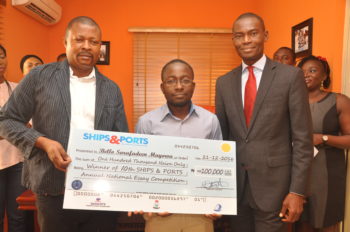
A young architect, Sarafadeen Mayowa Bello has emerged best overall winner of the 2016 Ships & Ports Annual National Essay Competition.
Bello emerged ahead of six other winners who got the ACG Charles Edike Prize for Outstanding Essays and Princess Vicky Haastrup Prize for Research in the 10th edition of annual essay competition, with the topic, “Non-oil exports as panacea for economic recession.”
At a brief presentation ceremony held at the Ships & Ports headquarters in Lagos on Wednesday, Mayowa said he picked interest in the competition in 2013.
“I am overwhelmed. I picked interest in the competition in 2013 when I discovered that the competition was held annually and so I started listening to Ships and Ports radio daily and also found the website very interesting, as it bears a lot of information on diverse topics. I get a lot of information from the website that helps me in my writing,” he said.
Other winners in the 2016 Ships & Ports Annual National Essay Competition include Bakare Moshood Oladejo, Daniel Philip Ayo, Nwoke Ifeoma Joy, Ogbagba Sunday, a student of Public Administration at the University of Nigeria, Nsukka and Abel Anna Ogechi, a corps member in Akwa Ibom State, who all won the ACG Charles Edike Prize for Outstanding Essays, while Babatunde Omoju, a lecturer at the Maritime Academy of Nigeria (MAN) Oron, Akwa Ibom State, won the Princess Vicky Haastrup Prize for Research.
The Chief Executive Officer of Ships & Ports, Mr. Bolaji Akinola said the essay was instituted to make young people pick interest in maritime business and to also contribute intellectually to the development of the maritime sector.
He said, “We have done this for 10 years. We believe that Ships & Ports has a lot to do towards development of the maritime industry. Sadly government neither understands nor appreciates the potentials of the maritime industry.
“President Olusegun Obasanjo is the only President that understood and tried to reposition the industry. He is the only president that showed understanding of the importance of shipping and the larger maritime sector.
“I hope the present government will take a cue from that administration to fast track the development of the sector for the nation’s economic well being.”
“I hope this present leadership means well for maritime, because the current minister has no development agenda other than to set revenue target. You don’t set revenue target for regulatory agencies. Now they are all talking revenue generation. This is abnormal. Regulation has been relegated to the background because of money and they are not even making the money. The Customs too has abandoned trade facilitation and is talking only money.
“Government is also killing the sector with bad policies. The national automotive policy and the policy on rice importation are some of the bad policies this government inherited from the past government and we expect this government to review them but it has not. The damage these policies are doing to our country is great.
“Former President Jonathan slammed 70 per cent tariff on imported vehicles and because of that importers use Cotonou Port because duty there is only 10 per cent and the vehicles are smuggled into Nigeria. Nigerian governments continue to make unfavourable policies that favour neighbouring countries and we create jobs for the Republic of Benin because their dockworkers do the discharge of the ships.
“Government should reduce the import duty and take it back to the 10 per cent it was. Vice President Osinbajo during the campaigns in Lagos promised that the APC government would review the auto policy but more that one year after nothing has been done.
“There is need to depoliticize appointment in the maritime industry,” he said.
He thanked Dangote Port Operation and the Nigeria Customs Service Zone A, Lagos for supporting the annual essay competition. He also admonished the winners in the essay competition to take interest in the maritime sector.
Also handy at the prize presentation ceremony was multiple award winning investigative journalist, Emmanuel Mayah who lauded the participants for their interest in national issues and charged them to keep contributing to national discourse.
“The fact that you participated leaves us with so much hope. Our reactions to important national issues have been so disheartening. Maritime is technical and the more we become aware of it the better for us as a nation. It is our duty to develop ourselves and benchmark what we do with what people do in developed nations.
“The fact that you took time to do research into this maritime issue is worthy. After oil, maritime is the next biggest income earner. A country like the Republic of Benin does mainly transshipment and they are building infrastructures with just that,” he said.